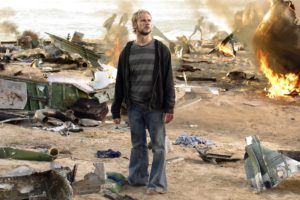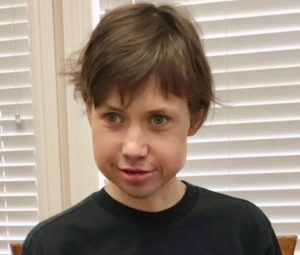When Dreams Crash and Burn

I’m posting this on what would have been my son Joseph’s 34th birthday. Last summer we lost him to melanoma.
Since then, blogging has become difficult. Instead, I’ve been helping folks as an editor/book doctor (see for example the recent releases by Bill Ketchum and Paul Clayton). I’m also serving as a judge in a literary awards competition. Such activities provide a welcome distraction.
The impulse to observe this date with just a few more words came to me as I was listening to an audiobook that mentioned the “Lost” television series. I’d never seen the show, but took note of the book’s description of its concept and aftermath.
In particular, I reacted to learning many loyal viewers of that popular drama felt cheated after the final episode, because they’d expected a meaningful resolution. Having invested emotional energy in the characters and their predicament, over a period of several years, they suddenly found themselves wondering what it had all meant. They’d wanted some kind of takeaway, which author Derek Thompson calls “an a-ha! moment.”
I share that confusion.
I’ve been feeling the same way since Joseph died last summer. He began life an utterly beautiful and much-loved child, but practically from Day One he had acute problems. So his mom and I devoted our lives to finding ways of improving his options and, if possible, to restoring him to the wellness we believed was rightfully his. My memoir dramatizes that campaign.
I wanted my book to be about Joseph, but it couldn’t escape the adult perspective. These were facts of our experience:
- At first, we expected someone in the medical profession to identify and treat Joseph’s condition, but that did not occur.
- Over time, we discovered other families with the same dilemma.
- None of us could really explain what had gone wrong.
- Each of us individually had to come to terms with the fact that the life we’d known was forever changed.
After several false starts, we found providers willing and able to help. Then I believed, with all my heart, that he was on the path to significant improvement, if not full recovery.
From time to time, unexpectedly, surprising and wonderful things happened. Perhaps they signified that this ordeal was some kind of test for us. There was this sense of being hot on the trail of a marvelous breakthrough, something that would not only change his life, and our lives, but also offer encouragement to others. That prospect was more than exciting.
And, you know, it wasn’t a bad way to live, having that kind of expectation.
Then there were the down times, lengthy intervals when progress for him was nonexistent, all objective evidence showed he would never participate normally in life, and my feelings cycled between despair and rage. My love for Joseph never faltered, but my unhappiness was tangible. I could only guess at his take on the situation.
After a few years our home-based treatment program for him ran out of steam (as did we), but Joseph remained my primary concern in life. I continued looking for and trying to implement new ideas. This lengthy phase is summarized at the end of my book.
Then, after several more years, Joseph got sick.
A new campaign kicked into gear. In some respects it followed the pattern of the first, the one I’d written about. I found it necessary to become a difficult customer and insist that he receive competent medical attention, because once again the first providers I’d turned to stonewalled us. Then, again, we found our way to someone with a game plan, whereupon Joseph’s condition improved markedly.

Remembering the boy
The crisis wasn’t resolved, but as before we became almost comfortable, at least sometimes. Again, we’d achieved an arrangement in which he was impaired but stable. We hoped for the best.
That is, until last spring, when Joseph began a very steep and irreversible decline.
All those years, all that effort, all that emotion—what did it mean? Surely, I thought, it had to have meant something. Poor Joseph had not endured all the discomfort for no purpose. Or had he?
It’s my understanding that everybody tells themselves stories as they go through life. Someone’s story becomes part of his or her identity. A life story doesn’t just say what happened, it says what the events mean and why they’re important.
That’s why I took note on hearing about the above tv series. Here was another case that had raised expectations without providing a proper resolution. I made a point of borrowing some of the episodes in DVD format from the public library. And the basic dramatized concepts felt very familiar:
- The stranded plane crash survivors expect to be rescued, but that doesn’t happen.
- There’s evidence that other people have been in the same situation.
- There are no real explanations.
- It’s necessary to come to terms with a new reality. Their former lives have ended and no longer matter. They are starting anew.
All of the above resonates with me. I recognize it. Do you?
Life can present turning points that we don’t welcome but cannot escape. Surely, that was a large part of the appeal of this series. Viewers saw a metaphor for their own crises.
Also, each episode hints that there’s more to the story, something not fully revealed to the characters. Some of them experience personal growth or acquire new abilities, presumably because of some elusive truth never previously suspected. A fuller understanding of all that is perhaps just around the corner.
This analysis is based on having seen only about half of the first season, but I can well imagine how viewers who’d followed it all the way to the end, through six seasons, might have felt let down when everything just ended.
(And yes, I know there are websites where people brag about having figured it out. There are people who say the same thing about life in general, too.)
All right, there’s the problem. I do not pretend to be unique in suffering from it. A young couple despairs when a long-awaited pregnancy turns into a miscarriage. A hardworking entrepreneur invests everything in a business, only to see it fail due to factors beyond his control. Somewhere in the world, war or cruelty or plain bad luck totally wrecks cherished hopes and plans every single day. When such things happen, as a minimum, one’s personal story needs revision. But what if it no longer makes sense at all?
Coming to terms with this might involve referring back to the above bullet lists.
- Nobody is going to come along and make things all better.
- Everybody is in the same boat (at least potentially).
- We won’t have a satisfactory explanation in this life.
- Might as well accept the new reality!
Maybe that was the intended point of the “Lost” series.
My college roommate, a philosophy major, might’ve called this conclusion “empowering.”
In one episode of “Lost,” the characters, stranded on their deserted tropical island, find a set of golf clubs in the wreckage of their plane. They decide to play golf. Why not?
For me, working with words still feels akin to the pursuit of truth. I may not find anything, but it’s what I most enjoy doing. In that respect, life is going to continue, and I’m going to enjoy it.
Tags: